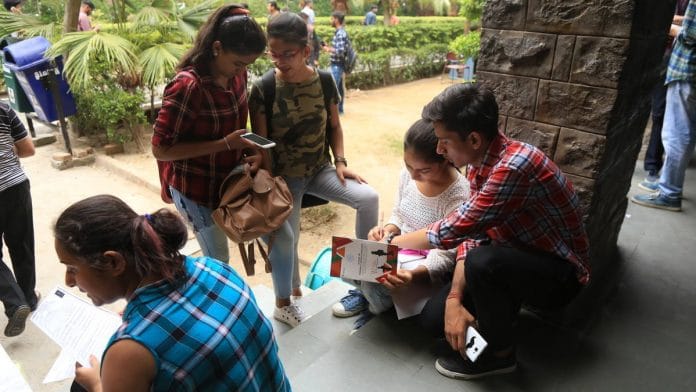New Delhi: Students pursuing regular degree courses such as BA, BCom, BSc, among others, will now be able to undertake internships as part of their course, just like their counterparts in professional courses like engineering and management.
The University Grants Commission (UGC) Friday released the apprenticeship/internship guidelines for degree programmes, under which they have allowed courses from any discipline to offer internships as a part of the programmes. These courses will be called ‘Internship/apprenticeship embedded degree programmes’.
Currently, only students pursuing professional courses like journalism, engineering, management and others are asked to undergo mandatory internships, but the same opportunity is not extended to a student pursuing, for example, BA in English (honours) or BCom (honours).
The UGC guidelines have asked colleges and universities to dedicate at least one full semester to internships and evaluate students on the basis of their internship experience.
The commission has also asked institutes to award 20 per cent of the total credits to the internships if they chose to offer students embedded degree programmes.
Also read: Indian universities didn’t need NEP to change things. But feared UGC too much
Need for a shift from ‘academic only’ approach
Making internships a part of the degree programmes is in line with the objective of the new National Education Policy (NEP) of making students employment-ready. The new NEP was released last week.
“With a large number of students enrolled in general degree programmes in India every year, there is a consensus among stakeholders for a shift from ‘academic only’ approach. The minimal linkage between the general degree curriculum and employer’s requirement calls for an effective remodelling of degree programmes, driven by changing needs of the industry and service sector,” the guidelines read.
According to the guidelines, any degree programme will be eligible for an embedded internship/apprenticeship programme.
Programmes that have internship as a part of the curriculum will offer a kind of a traineeship, which will be undertaken not on the campus, but on the premises of the workplace where a student is pursuing internship. It could be a commercial or a non-commercial organisation.
The higher education institutes will have to sign a prior Memorandum of Understanding with discipline-specific commercial and non-commercial organisations for providing apprenticeship/internship, before introducing the embedded degree programmes. The courses will be planned based on the facility and infrastructure available.
The guidelines stated that students will be evaluated based on their internships and the final scores will reflect in their mark sheets.
Institutes will carry out the evaluation along with the organisation, which is offering the internships. For example, if a student is interning with a media organisation, editors in the organisation will give a certificate to the student and it will be a part of the student’s final result.
Also read: Modi govt’s NEP is out of touch with reality, Indian voters want English-medium education







hope the student become conscious of them being skilled enough to be a productive employee in any enterprise after the completion of college. they must research to find the jobs in demand and create skills in those area. they must start this process from 2nd year onwards so that by 3rd year completion they have something to speak to their employees
Last year student are worried about their future decision must not be delayed what to do about future study
Nothing
Please take decision on exams
Please taken a decision on exam facing problems stops our education
Student will taking admission for next education job